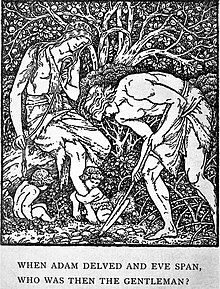分享對象:公開
 182 William Morris and the Kelmscott Press 2017-08-03 【漢清講堂】
182 William Morris and the Kelmscott Press 2017-08-03 【漢清講堂】
分享對象:公開

182 William Morris and the Kelmscott Press 2017-08-03 【漢清講堂】
On World Friendship Day to quote from 'A Dream of John Ball' written by William Morris in 1888 ...
On World Friendship Day to quote from 'A Dream of John Ball' written by William Morris in 1888 ...
John Ball (priest)
John Ball
| |
|---|---|

Medieval drawing of John Ball giving hope to Wat Tyler's rebels
| |
| Born | c. 1338 |
| Died | 15 July 1381 (aged 42/43)
St Albans
|
| Nationality | English |
| Occupation | Priest |
| Known for | Peasants' Revolt |
John Ball (c. 1338[1] – 15 July 1381) was an English priest who took a prominent part in the Peasants' Revolt of 1381.[2] Although he is often associated with John Wycliffe and the Lollard movement, Ball was actively preaching 'articles contrary to the faith of the church' at least a decade before Wycliffe started attracting attention.[3]
John Ball's line, "When Adam delved and Eve span, Who was then the gentleman?" serves as the epigraph to Zadie Smith's 2012 novel NW, which follows characters who grew up on a council estate in northwest London.
In Act V Scene 1 of Hamlet, Shakespeare has the Gravedigger (First Clown) discuss the line "When Adam delved and Eve span, Who was then the gentleman?" with a bit of a reversed sense: in Adam's time there were none but gentlemen.
David Grocott
The William Morris Appreciation Society

David Grocott
Six hundred and 39 years ago today a Colchester man awoke to await sentence having been convicted for his part in leading a rebellion against the perceived misrule of England.
His name was John Ball.
As part of the prosecution evidence against him a pamphlet was read aloud to the court that used Ball's pseudonym of John Schep - John the Sheppard.
'Johon Schep, som tyme Seynte Marie prest of York, and now of Colchestre,
greteth wel Johan Nameles, and Johan the Mullere, and Johon Cartere, and
biddeth hem that thei bee war of gyle in borugh, and stondeth togidre in Godes
name, and biddeth Peres Ploughman go to his werk, and chastise wel Hobbe the
Robbere, and taketh with yow Johan Trewman and alle hiis felawes, and no mo,
and loke schappe you to on heved, and no mo.'
'Johan the Mullere hath ygrounde smal, smal, smal;
The Kynges sone of hevene schal paye for al.
Be war or ye be wo;
Knoweth your freend fro your foo.
Haveth ynow, and seith "Hoo!"
And do wel and bettre, and fleth synne,
And seketh pees, and hold you therinne.'
Ball had survived the Black Death and had seen the economic repression of the following years.
He questioned assumed authority and envisaged a world of radical egalitarianism.
He is the first named person in the history of western thought to have envisaged such a future and from him emanates a golden thread of thinking that runs through Lilburne, Winstanley, Chartists, Engles, Marx, Ulyanov, Hardie and into the modern era of egalitarianism.
Ball - the fountainhead of global socialism - was from Colchester.
His home town cultivated his ideas, strong as a shire horse, of emancipated serfdom. Once sired, his concept, trained and broken in the East Anglian fields following the retreating tide of pestilence, could not be bridled. Ball watched it gain strength. Emboldened on the rich beer of Lollard rhetoric he smoothed its sides and tended to its needs, he slipped the lock from its stable and and let it bolt.
'When Adam delved and Eve span, who was then the gentleman?'
Ball's idea is still running.
On 13th July 1381 Ball and his ideas were on trial.
Both were found guilty of treason and two days later - on July 15th - Ball was hung, drawn and quartered in front of St Albans Cathedral. His body parts were sent to four corners of the realm.
The 14-year-old king Richard II who had smoothed the tempers of the revolutionaries of the Peasants' Revolt weeks before with his fugacious smile watched the execution with glee.
He commented: "You wretches - detestable on land and sea: you who seek equality with lords are unworthy to live. Give this message to your colleagues: rustics you were, and rustics you are still; you will remain in bondage, not as before, but incomparably harsher. For as long as we live we will strive to suppress you, and your misery will be an example in the eyes of posterity. However, we will spare your lives if you remain faithful and loyal. Choose now which course you want to follow."
This year events - my goodness - have been against us but today, on John Ball Day, please can I ask one thing. Please think a mo on Ball and the fact that 639 years on we fight the same fight. We carry each day an ember that was lit by a man of our town.
Hopefully - pandemics aside - we can do him justice next year for the 640th anniversary of his martyrdom.


